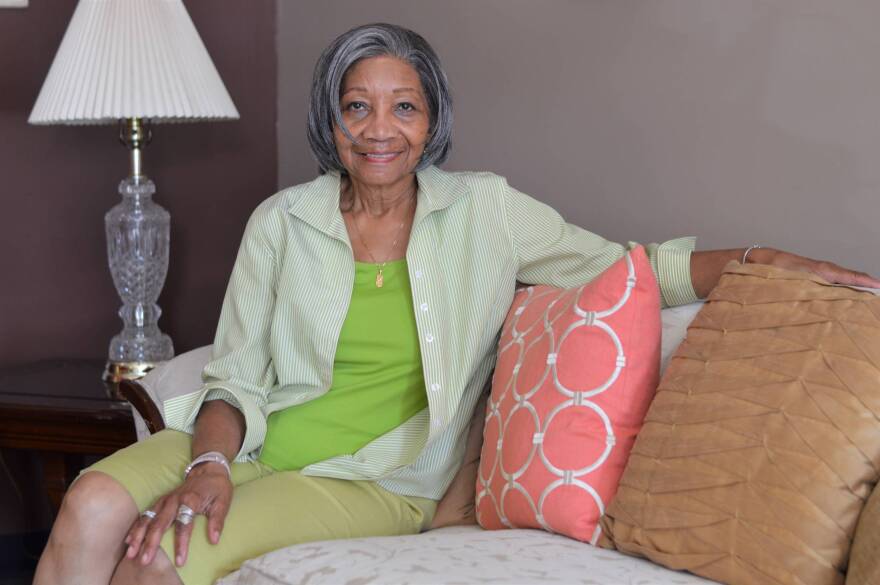
Detroit might not be ready for the wave of baby boomers who are aging. The oldest baby boomers are now 71. The youngest are 53. Right now in Detroit, many seniors rely on informal networks of neighbors, family, or friends.
In Detroit, 41 percent of people over 60 live alone according to a report by Data Driven Detroit based on 2010 Census data.
That’s the case with Ida Brown, 87, who lives in a house in the MorningSide neighborhood of Detroit.
Although she has lived there three years, she really hasn’t gotten to know her neighbors.
“I might could if I was more outgoing with people, but I just have never in my life been the person that goes and talk a lot to other people. If they don’t seem to interested too much in me, I leave them alone and don’t bother them,” Brown said.
Recently she got a new neighbor across the street. Ted Shumaker says he is making an effort to get to know the people who live in MorningSide.
“You know, try to reach out to my neighbors. I know pretty much everyone within a, you know, four to five house radius on my block,” he explained.
That includes Ida Brown.
In her house, filled with her doll collection, Brown laughed.
“Oh, I met him and he was friendly. But I don’t bother you when you’re not too friendly,” she said.
Shumaker checks in on Brown. They seem to like each other and laugh together a lot. Brown’s daughter also checks in on her. She takes her to the grocery store and to appointments. The house in which Ida Brown lives is owned by her daughter.
Not all senior citizens are that fortunate.

Mary Ann Frazier owns M & D Pharmacy on Mack Avenue near the MorningSide neighborhood. She says many of her older customers are unable leave home even to pick up a prescription. Many cannot drive because of vision problems or other physical ailments. Walking or bicycling are beyond their abilities.
She notes it appears many of those seniors are alone no one is checking on them.
“A lot of times, I don’t think so. So, my delivery girl goes checks on them and I talk to them on the phone,” she said.
Frazier started those deliveries specifically for the elderly shut-ins in the surrounding neighborhoods.
In the same building next to the pharmacy, Bettye Wright has opened a senior day care center named TobeMC (pronounced TOBE MAC). The name is in honor of her father. She says he took care of elderly relatives and others who needed a little help in their northwest Missouri hometown.
Wright is a retired nurse and physician’s assistant. She wants to help seniors to live active lives.

So far, Wright is not being swamped with paying customers.
“Well, right now no one is paying and that’s okay.”
She says the larger struggle is getting government help. When she has approached state agencies, she’s told the funds have run out.
Wright used her own savings to launch the TobeMC Senior Daycare Center. As for the rent of the space, pharmacist Mary Ann Frazier owns the building and rent payments are –let’s say she’s allowing a delay.
The senior center is cozy. There is nice furniture, provided by Wright. It’s like a tiny hotel lobby with additional space in a larger area for exercise and craft activities.
A group of women were chatting in an area decorated with some of their own art. Mamie Walker, a friend of Bettye Wright’s, is a big advocate of getting the senior center off the ground.

“We’re all getting older and we need a place where we can come to socialize, have bible study, have exercise, being able to communicate with one another. And it’s a relaxing place. It gives you peace of mind,” she explained.
The other women nodded in agreement.
Bettye Wright says for seniors who spend a lot of time alone, the little things mean a lot.
“Just sitting with someone and chatting with them, I mean, it’s so interesting to be in the midst of maybe three or four. Everyone wants to talk at the same time because they don’t have a lot of opportunities to talk,” she said.
There’s an economic argument for funding a senior center like this. Active seniors usually stay in their homes longer. That means a stay in the nursing home is shorter. At an average nursing home cost of $7,500 a month, almost 32 percent of all Medicaid goes to long term care. But seniors who have Medicaid can get a waiver for senior daycare which is much cheaper. Usually about $1,500 a month.
But, in a city of 700 thousand people, Detroit only has about 20 senior daycare centers. Some of those operate out of houses too small to host very many people.
Those home senior centers and TobeMC are doing what they can to survive and help the elderly remain alert and active.
Detroit is a city where putting something together out of nothing to meet the needs of the neighborhood is normal. There’s an old saying, “Making a way out of no way.” It’s how many neighborhoods take care of their people.
The question is, will Detroit’s best efforts manage to help the huge wave of elderly baby boomers which grows every year.
Support for the Detroit Journalism Cooperative on Michigan Radio comes from the John S. and James L. Knight Foundation, the Ford Foundation and the Corporation for Public Broadcasting.






